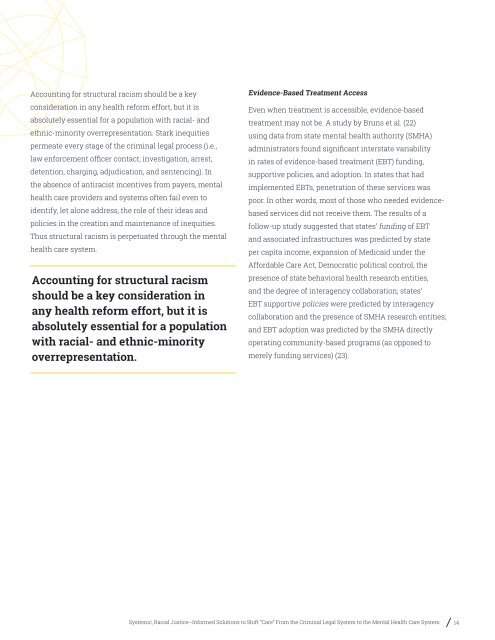Systemic, Racial Justice–Informed Solutions to Shift “Care” From the Criminal Legal System to the Mental Health Care System
You also want an ePaper? Increase the reach of your titles
YUMPU automatically turns print PDFs into web optimized ePapers that Google loves.
Accounting for structural racism should be a key<br />
consideration in any health reform effort, but it is<br />
absolutely essential for a population with racial- and<br />
ethnic-minority overrepresentation. Stark inequities<br />
permeate every stage of <strong>the</strong> criminal legal process (i.e.,<br />
law enforcement officer contact, investigation, arrest,<br />
detention, charging, adjudication, and sentencing). In<br />
<strong>the</strong> absence of antiracist incentives from payers, mental<br />
health care providers and systems often fail even <strong>to</strong><br />
identify, let alone address, <strong>the</strong> role of <strong>the</strong>ir ideas and<br />
policies in <strong>the</strong> creation and maintenance of inequities.<br />
Thus structural racism is perpetuated through <strong>the</strong> mental<br />
health care system.<br />
Accounting for structural racism<br />
should be a key consideration in<br />
any health reform effort, but it is<br />
absolutely essential for a population<br />
with racial- and ethnic-minority<br />
overrepresentation.<br />
Evidence-Based Treatment Access<br />
Even when treatment is accessible, evidence-based<br />
treatment may not be. A study by Bruns et al. (22)<br />
using data from state mental health authority (SMHA)<br />
administra<strong>to</strong>rs found significant interstate variability<br />
in rates of evidence-based treatment (EBT) funding,<br />
supportive policies, and adoption. In states that had<br />
implemented EBTs, penetration of <strong>the</strong>se services was<br />
poor. In o<strong>the</strong>r words, most of those who needed evidencebased<br />
services did not receive <strong>the</strong>m. The results of a<br />
follow-up study suggested that states’ funding of EBT<br />
and associated infrastructures was predicted by state<br />
per capita income, expansion of Medicaid under <strong>the</strong><br />
Affordable <strong>Care</strong> Act, Democratic political control, <strong>the</strong><br />
presence of state behavioral health research entities,<br />
and <strong>the</strong> degree of interagency collaboration; states’<br />
EBT supportive policies were predicted by interagency<br />
collaboration and <strong>the</strong> presence of SMHA research entities;<br />
and EBT adoption was predicted by <strong>the</strong> SMHA directly<br />
operating community-based programs (as opposed <strong>to</strong><br />
merely funding services) (23).<br />
<strong><strong>System</strong>ic</strong>, <strong>Racial</strong> <strong>Justice–Informed</strong> <strong>Solutions</strong> <strong>to</strong> <strong>Shift</strong> <strong>“<strong>Care</strong>”</strong> <strong>From</strong> <strong>the</strong> <strong>Criminal</strong> <strong>Legal</strong> <strong>System</strong> <strong>to</strong> <strong>the</strong> <strong>Mental</strong> <strong>Health</strong> <strong>Care</strong> <strong>System</strong> 14

















